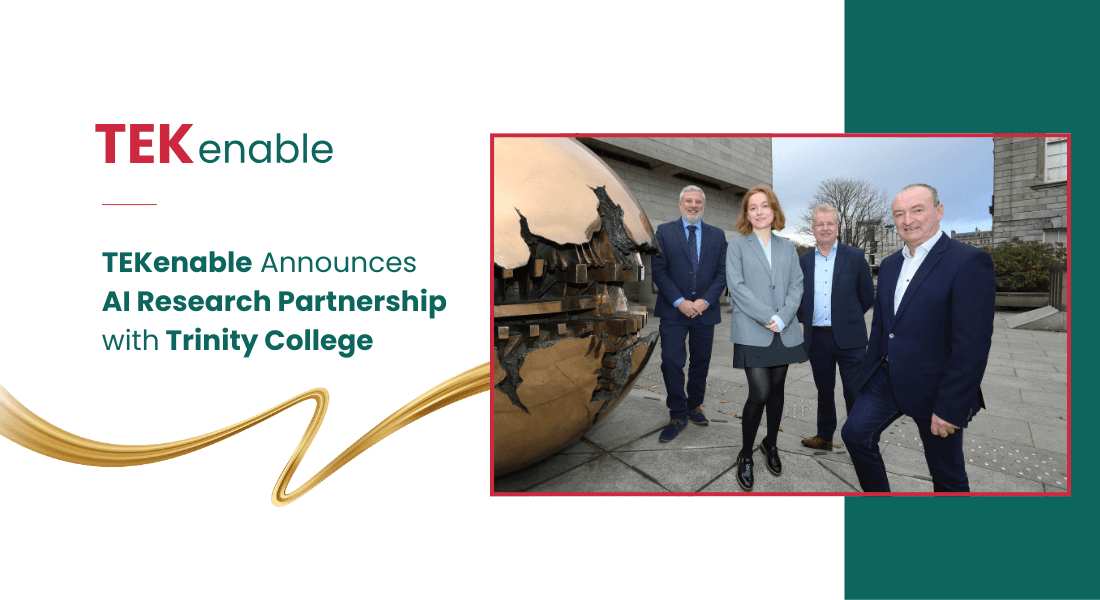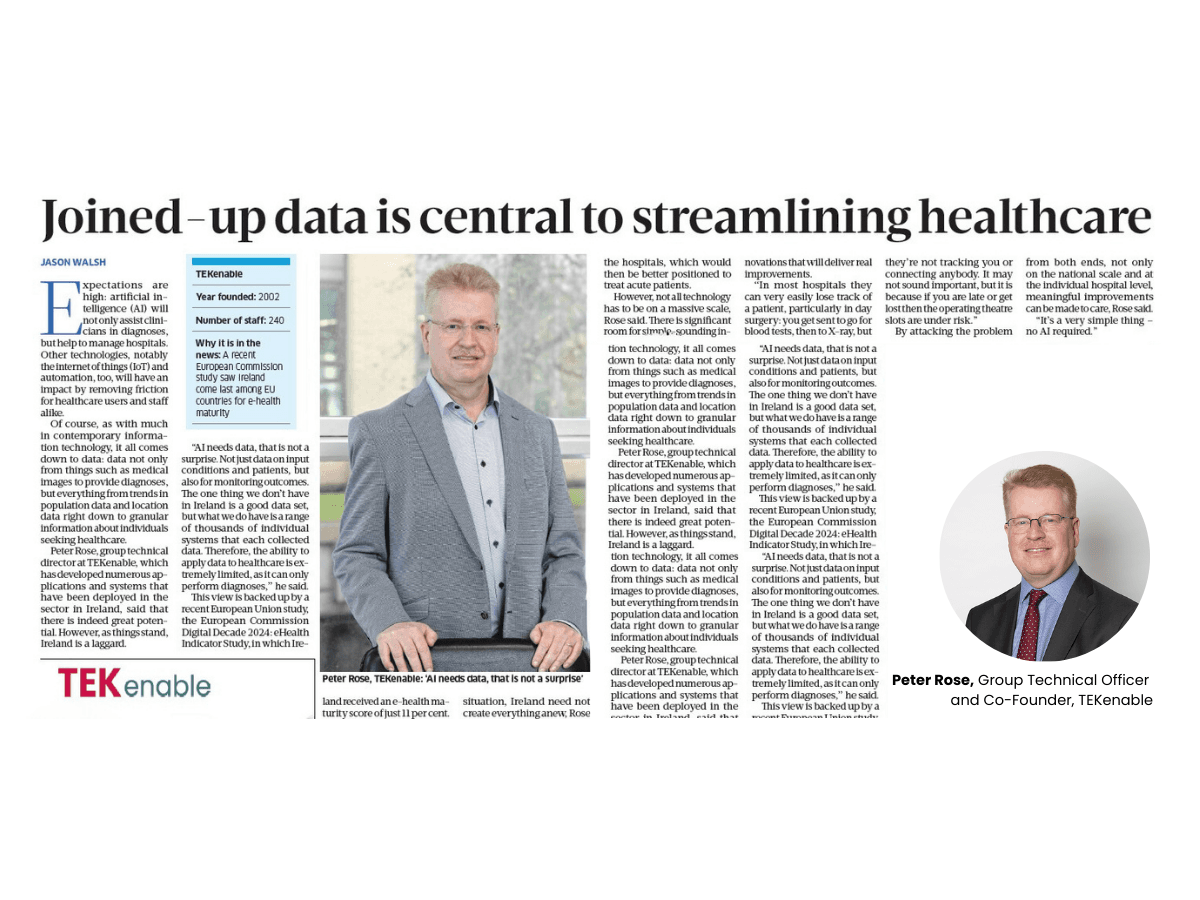Recent years have seen public sector IT projects driving digital transformation across the country, but plenty of ambitious targets remain to be met.
Across Europe, and not least in Ireland, government and public sector services are increasingly delivered online. Everything from local services to regulatory bodies now have online presences, but demand is growing, both from the public and from politicians, for more self-service and greater ease of use.
Maurice Hally, public sector lead at developers and digital transformation consultancy TEKenable, said that the targets he had heard, on both a European and a national level, were ambitious. However, they were also achievable if time and effort were dedicated to them.
“I was listening to a presentation from the LGMA [the Local Government Management Agency] where it was stated that under the European digital framework initiative there are plans to have 100 per cent of key services online for 2030. I thought that was very ambitious. I started looking into it and for Ireland it’s a 90 per cent goal for 2030. That is an ambitious target, too, but it’s clearly one we should be working towards,” he said.
TEKenable has delivered novel solutions for organisations including Dublin City Council as well as contract tracing and PPE-related apps and software for the HSE, and Hally said there is a strong drive for digital-led change across the sector.
“When we work with clients in the public sector they are really demonstrating a will to innovate and take on board digital transformation,” he said.
Way Ahead
While Ireland is not a leader in digital public service and government, nor is it a laggard, with many organisations dealing with service users online.
“There are some countries like Estonia that are way ahead in terms of digitisation of public service, but they are the outlier. The vast majority of countries are not moving as quickly but are making steady progress.
“We are aware of upcoming digital initiatives that will have a significant positive impact and should place Ireland in a leadership position, albeit still behind Estonia,” he said.

In his job leading the public sector practice for TEKenable Hally is seeing an uplift in terms of demand, driven to a significant degree by digital transformation. However, the complexity of the job done by the public sector and the need for accountability and ensuring money is not wasted means that decisions cannot be taken lightly.
“From my perspective there is a strong appetite within government agencies to drive innovation and digitise processes however sometimes they can’t go as fast as they want to, due to the complexities and time constraints associated with the tendering process, which affects all parties involved.
“The tendering process can be complex, and necessarily so in terms of what the public sector has to deal with. They have to follow certain procedures and they are very thorough processes. However, I’ve been at events where the government is encouraging SMEs to respond to tenders, so there is a will there. They’re trying to lift the barriers,” he said.
The work being done is typically related to creating new front-end systems that are responsive to user needs. Partly this is because of growing demand for quality apps and services driven by users’ experiences with the likes of Apple, Amazon and Google, but it is also because significant back-end IT modernisation has already occurred.
“A lot of the back end, at the majority of organisations I deal with, has already been moved to the cloud, though in some sectors they can’t. With front-end systems that users interact with, it’s around the design.
If you’re using the right services, say Microsoft Power Apps, it can be relatively straightforward to get a portal up and running quite rapidly, so it’s not that there’s a huge technological barrier,” he said.
More Accurate
Digital public service encompasses a lot more than the obvious services like motor tax, health and social security. For example, regulatory bodies are now getting more, and more accurate, feedback from citizens, which helps them not only to deal with potential breaches of conduct but also feed back into government.
“Regulators such as the Competition and Consumer Protection Commission, I know that they’re seeing a big uptick in terms of seeing people engaging with their services online. The Commission for Regulation of Utilities, too.
“The simple truth is that the more accessible you make the services, the more people are going to use them,” Hally said.
When it comes to delivering more and better services, a model Ireland could look to is one that is not terribly far away.
“I’d say the Nordic countries stand out, primarily due to substantial investments in digital transformation, [though] I believe Ireland has made significant strides in recent years,” he said.
Given that the public sector is subject to intense scrutiny and indeed criticism, it is important to recognise that in its pandemic response the government was willing and able to innovate quickly, Hally said.
“A lot of progress had to be fast tracked during the pandemic and in many areas the Irish government swiftly adapted to deliver critical services online and this crisis-driven acceleration should serve as a foundation for sustained growth in our digital public services”.
TEKenable’s practical experience during the trying times of the pandemic was a positive one, Hally said.
“We were very pleased to support the HSE with their response to the Covid pandemic by developing a Covid-19 contact tracing system and the public-facing PCR and antigen test results portals, and a PPE order management system.
“I was really impressed with the expertise and dedication of the HSE staff we collaborated with during that period. We have never seen systems designed and developed so fast and so successfully in the context of a continually evolving situation.”
As for the future, Hally said good work had been done and companies like TEKenable stood ready to do more.
“We’re seeing a real increase in the demand for digital solutions in the public sector, and we want to be a strong partner. We have a strong track record in the space,” he said.
The momentum that has been built should be kept up by developing solid long-term plans, adequate funding, and a mindset that’s open to embracing digital solutions, he said.
“The good work we started during the pandemic should have a lasting impact and it’s crucial that we don’t treat these digital improvements as just a short-term fix. Instead, they should become part of our public sector’s DNA, making it more adaptable and efficient into the future”.
The above text first appeared in Sunday Business Post on October 6th, 2023.





